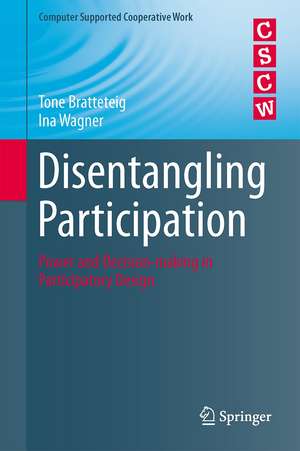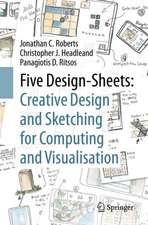Disentangling Participation: Power and Decision-making in Participatory Design: Computer Supported Cooperative Work
Autor Tone Bratteteig, Ina Wagneren Limba Engleză Hardback – 21 aug 2014
Din seria Computer Supported Cooperative Work
- 20%
 Preț: 1044.25 lei
Preț: 1044.25 lei - 20%
 Preț: 650.59 lei
Preț: 650.59 lei - 20%
 Preț: 647.61 lei
Preț: 647.61 lei - 20%
 Preț: 638.55 lei
Preț: 638.55 lei - 20%
 Preț: 334.53 lei
Preț: 334.53 lei - 20%
 Preț: 328.79 lei
Preț: 328.79 lei - 20%
 Preț: 334.71 lei
Preț: 334.71 lei - 20%
 Preț: 330.90 lei
Preț: 330.90 lei - 20%
 Preț: 328.79 lei
Preț: 328.79 lei - 20%
 Preț: 649.28 lei
Preț: 649.28 lei - 20%
 Preț: 643.50 lei
Preț: 643.50 lei - 20%
 Preț: 329.91 lei
Preț: 329.91 lei - 15%
 Preț: 642.83 lei
Preț: 642.83 lei - 20%
 Preț: 648.11 lei
Preț: 648.11 lei - 20%
 Preț: 996.40 lei
Preț: 996.40 lei - 20%
 Preț: 647.79 lei
Preț: 647.79 lei - 20%
 Preț: 413.81 lei
Preț: 413.81 lei - 20%
 Preț: 336.02 lei
Preț: 336.02 lei - 20%
 Preț: 346.10 lei
Preț: 346.10 lei - 20%
 Preț: 330.24 lei
Preț: 330.24 lei - 20%
 Preț: 982.36 lei
Preț: 982.36 lei - 20%
 Preț: 329.11 lei
Preț: 329.11 lei - 20%
 Preț: 987.32 lei
Preț: 987.32 lei - 20%
 Preț: 641.34 lei
Preț: 641.34 lei - 20%
 Preț: 648.26 lei
Preț: 648.26 lei - 20%
 Preț: 995.89 lei
Preț: 995.89 lei - 20%
 Preț: 643.63 lei
Preț: 643.63 lei - 20%
 Preț: 988.98 lei
Preț: 988.98 lei - 20%
 Preț: 328.42 lei
Preț: 328.42 lei - 20%
 Preț: 988.81 lei
Preț: 988.81 lei - 20%
 Preț: 643.30 lei
Preț: 643.30 lei - 20%
 Preț: 987.17 lei
Preț: 987.17 lei - 20%
 Preț: 329.58 lei
Preț: 329.58 lei - 20%
 Preț: 330.42 lei
Preț: 330.42 lei - 5%
 Preț: 365.82 lei
Preț: 365.82 lei - 20%
 Preț: 650.08 lei
Preț: 650.08 lei - 20%
 Preț: 334.38 lei
Preț: 334.38 lei - 20%
 Preț: 645.79 lei
Preț: 645.79 lei - 20%
 Preț: 650.40 lei
Preț: 650.40 lei - 20%
 Preț: 333.88 lei
Preț: 333.88 lei - 20%
 Preț: 1263.81 lei
Preț: 1263.81 lei - 20%
 Preț: 830.58 lei
Preț: 830.58 lei - 20%
 Preț: 704.70 lei
Preț: 704.70 lei
Preț: 309.58 lei
Preț vechi: 386.98 lei
-20% Nou
Puncte Express: 464
Preț estimativ în valută:
59.24€ • 64.33$ • 49.77£
59.24€ • 64.33$ • 49.77£
Carte tipărită la comandă
Livrare economică 18-24 aprilie
Preluare comenzi: 021 569.72.76
Specificații
ISBN-13: 9783319061627
ISBN-10: 3319061623
Pagini: 126
Ilustrații: VIII, 118 p. 29 illus.
Dimensiuni: 155 x 235 x 15 mm
Greutate: 0.36 kg
Ediția:2014
Editura: Springer International Publishing
Colecția Springer
Seria Computer Supported Cooperative Work
Locul publicării:Cham, Switzerland
ISBN-10: 3319061623
Pagini: 126
Ilustrații: VIII, 118 p. 29 illus.
Dimensiuni: 155 x 235 x 15 mm
Greutate: 0.36 kg
Ediția:2014
Editura: Springer International Publishing
Colecția Springer
Seria Computer Supported Cooperative Work
Locul publicării:Cham, Switzerland
Public țintă
GraduateCuprins
Introduction.- Decision-making in design.- The cases.- Kinds of decisions.- Streams of decisions.- Power, influence, trust and loyalty.- Participation.- Conclusions.
Textul de pe ultima copertă
Providing a critical view on user participation in design, disentangling decision making and power in design, this book uses fieldwork material from two large participatory design projects: one experimental in the field of urban planning, the other a product development project within health care. Addressing power issues in participatory design is critical to providing a realistic view of the possibilities and limitations of participation. Design is decision-making: during a design process a huge number of decisions taken before the designers end up with a design result - an artefact or system. All decisions are a choice between possibilities and selecting one of them and making it concrete as a change in an artefact is a demonstration of the capacity to transform, which is a key aspect of power. Participatory designers are committed to empowering users and facilitating a design process where users are able to take part in all types of decisions. This volume explores the challenges for practitioners of participatory design arising from this commitment by asking what participation really means: who should participate and in which parts of a design process; what does it mean to share power with users; how are decisions to be made in a participatory way and what is it that users participate in? The book provides a conceptual framework for understanding these issues as well as a fresh look at participation.
Caracteristici
The first in-depth, detailed analysis of issues of power and decision-making in Participatory Design, based on rich empirical material Reviews and compares a wide range of theories from the social sciences and design communities, building a conceptual framework for understanding issues of power in collaborative contexts Translates highly complex as well as contested concepts, such as power and decision-making, into a design context, making them available to researchers and designers for reflection and analysis


























